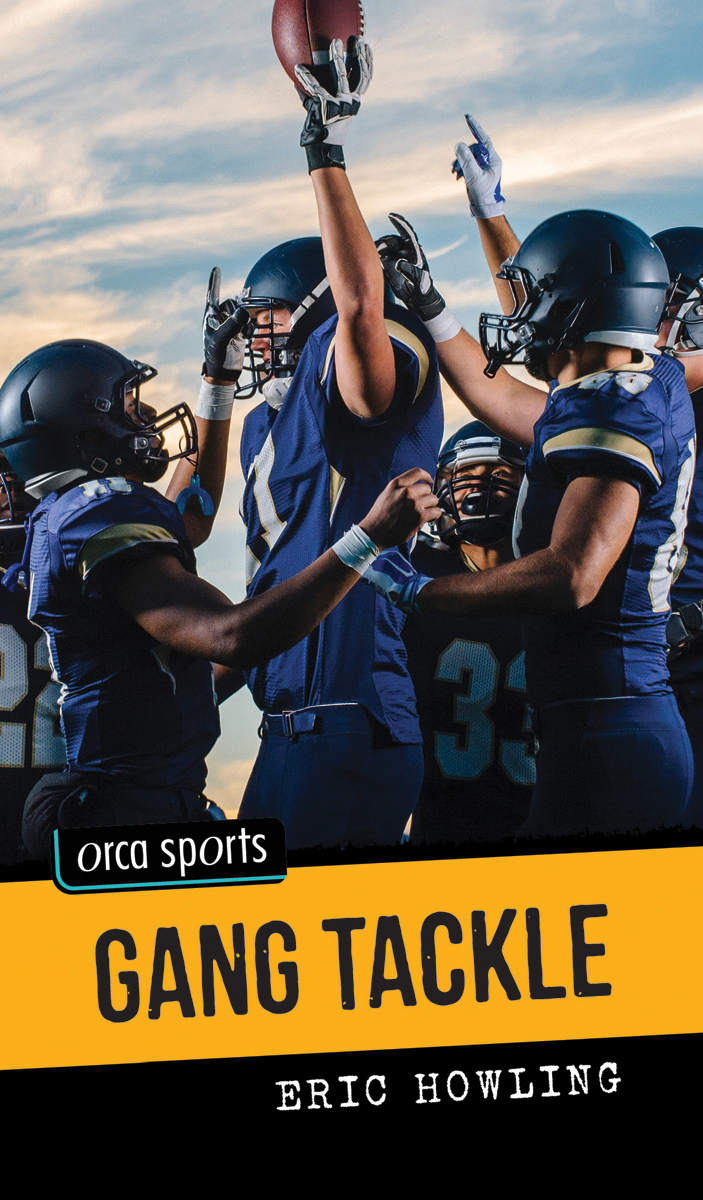#TuesdayTalk with Eric Howling. His novel, Gang Tackle , is on shelves now.
Tell us a bit about your book.
Gang Tackle is my sixth sports novel and the third time I’ve used high school football as a backdrop. At its heart, Gang Tackle is the story of how a team rises up to take down their racist and demeaning coach. Let me say right up front that most coaches are nothing like Coach Roland Fort. They’re selfless, hard working, put-the-team-first leaders and mentors. But a mean, bad-mouthing authority figure was what the story needed and what the story got. Here’s a brief synopsis: After the Southside Saints football team is disbanded because of budget cuts, Jamal and his friends are forced to play pick-up games on the hardscrabble field behind their high school. When the president of a sporting goods company offers to donate $20,000 worth of equipment to the team, Jamal is excited — even if the president demands to be coach. Coach Fort says he wants to help the disadvantaged players at Southside. But after telling the team that without him they’d all be in gangs, or in jail, or dead, they start to wonder who he’s really trying to help. The players are angry that Coach Fort thinks they have no future. Even though they come from a poor neighbourhood they all have ambition. Jamal, for example, spends his nights secretly learning computer code so he can create an online football game. Jamal and his teammates hatch a plan to get the coach fired. The scheme to sack the coach works but when Coach Fox quits he gets revenge by taking all the football equipment with him. The Saints need to come up with money for new uniforms — in a hurry. Their only chance is to sell Jamal’s game app online and hope for a miracle.
What was the catalyst for your story?
A few years ago a notorious big city mayor was fired as a high school football coach for putting down his players and the school. I wondered what would happen if a team decided they’d had enough of their bully coach and rose up to take him down.
What was your favourite book as a child and why?
Even though I’ve spent my career writing ads, I have a confession to make—I wasn’t the greatest reader as a kid. I was too busy playing sports—hockey, soccer, football, basketball, tennis, golf—to name just a few. I was never the best but I always enjoyed the competition and the close friendships of my teammates. I do remember racing through a few books in the Chip Hilton sports series written by Hall of Fame basketball coach Clair Bee. I guess it was a sign of things to come.
In your opinion, what makes a compelling story?
Having the protagonist overcome a big obstacle can drive a story from start to finish. Luckily, in sports there’s no end to challenges that seem insurmountable—the underdog, the rival, the injury, the mean coach. Making sure a reader can identify with the main characters and be able to place themselves in a story is crucial. The dialogue and sports sequences all have to be believable. Kids have instant radar and can sense when the language doesn’t ring true.
Do you gravitate toward a certain genre or type of writing?
I’ve always loved playing, watching and, as I got older, reading about sports. The reasons are pretty simple. First, you never know what will happen. How exciting is it to witness a goal in the desperate last seconds of a Stanley Cup game when the goalie is pulled? A homerun in the bottom of the ninth in the World Series? Or a game-winning basket at the buzzer of an NBA championship game? Trying to create the suspense on a page for these kind of moments is a fun challenge that keeps me coming back to the blank page every day. Second, the language. In basketball, you Drain a bucket from downtown. In hockey, you Beat the goalie top shelf. In football you Toss a Hail Mary long bomb. The language of sports is a collision of stick-in-your-brain phrases that synthesize street slang and sports talk. Descriptions filled with catchy metaphors that only a devoted fan or player would know. An insider’s dictionary of terms that make you feel like a member of an exclusive club.
What types of conversations do you hope will come out of your book?
They say that with great power comes great responsibility. All good coaches (and almost all are) know and respect this. But when a coach crosses a line, players and schools have to know they can push back and take action.
Tell us a little known or interesting fact about yourself.
Although I’ve worked in advertising for over thirty years, I started my career as an economist.
 Eric Howling is an advertising creative director and the author of the Lorimer sports novels Head Hunter, Red Zone Rivals, Hoop Magic, Kayak Combat and Drive. As a boy growing up in Montreal, Quebec, he always had a ball or stick or club in his hands. Now Eric’s writing stories about playing some of those exciting sports. His books have been shortlisted for the Hackmatack Children’s Choice Book Award, named Resource Links Year’s Best and picked as CCBC Best Books selections. Eric lives in Calgary, Alberta. Follow him on Twitter @erichowling.
Eric Howling is an advertising creative director and the author of the Lorimer sports novels Head Hunter, Red Zone Rivals, Hoop Magic, Kayak Combat and Drive. As a boy growing up in Montreal, Quebec, he always had a ball or stick or club in his hands. Now Eric’s writing stories about playing some of those exciting sports. His books have been shortlisted for the Hackmatack Children’s Choice Book Award, named Resource Links Year’s Best and picked as CCBC Best Books selections. Eric lives in Calgary, Alberta. Follow him on Twitter @erichowling.

